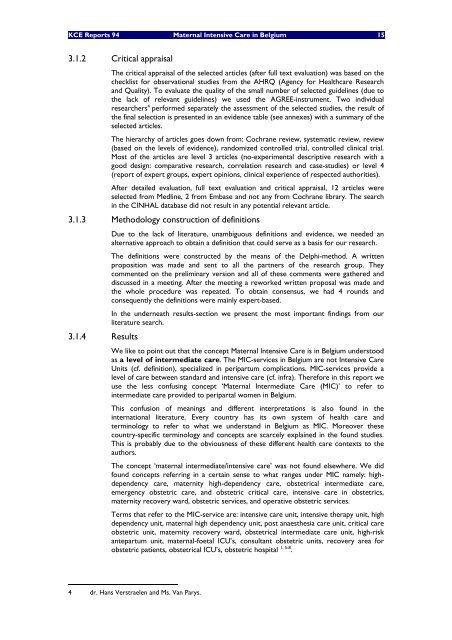Soins maternels intensifs (Maternal Intensive Care) en Belgique - KCE
Soins maternels intensifs (Maternal Intensive Care) en Belgique - KCE
Soins maternels intensifs (Maternal Intensive Care) en Belgique - KCE
You also want an ePaper? Increase the reach of your titles
YUMPU automatically turns print PDFs into web optimized ePapers that Google loves.
<strong>KCE</strong> Reports 94 <strong>Maternal</strong> <strong>Int<strong>en</strong>sive</strong> <strong>Care</strong> in Belgium 15<br />
3.1.2 Critical appraisal<br />
The critical appraisal of the selected articles (after full text evaluation) was based on the<br />
checklist for observational studies from the AHRQ (Ag<strong>en</strong>cy for Healthcare Research<br />
and Quality). To evaluate the quality of the small number of selected guidelines (due to<br />
the lack of relevant guidelines) we used the AGREE-instrum<strong>en</strong>t. Two individual<br />
researchers 4 performed separately the assessm<strong>en</strong>t of the selected studies, the result of<br />
the final selection is pres<strong>en</strong>ted in an evid<strong>en</strong>ce table (see annexes) with a summary of the<br />
selected articles.<br />
The hierarchy of articles goes down from: Cochrane review, systematic review, review<br />
(based on the levels of evid<strong>en</strong>ce), randomized controlled trial, controlled clinical trial.<br />
Most of the articles are level 3 articles (no-experim<strong>en</strong>tal descriptive research with a<br />
good design: comparative research, correlation research and case-studies) or level 4<br />
(report of expert groups, expert opinions, clinical experi<strong>en</strong>ce of respected authorities).<br />
After detailed evaluation, full text evaluation and critical appraisal, 12 articles were<br />
selected from Medline, 2 from Embase and not any from Cochrane library. The search<br />
in the CINHAL database did not result in any pot<strong>en</strong>tial relevant article.<br />
3.1.3 Methodology construction of definitions<br />
Due to the lack of literature, unambiguous definitions and evid<strong>en</strong>ce, we needed an<br />
alternative approach to obtain a definition that could serve as a basis for our research.<br />
The definitions were constructed by the means of the Delphi-method. A writt<strong>en</strong><br />
proposition was made and s<strong>en</strong>t to all the partners of the research group. They<br />
comm<strong>en</strong>ted on the preliminary version and all of these comm<strong>en</strong>ts were gathered and<br />
discussed in a meeting. After the meeting a reworked writt<strong>en</strong> proposal was made and<br />
the whole procedure was repeated. To obtain cons<strong>en</strong>sus, we had 4 rounds and<br />
consequ<strong>en</strong>tly the definitions were mainly expert-based.<br />
In the underneath results-section we pres<strong>en</strong>t the most important findings from our<br />
literature search.<br />
3.1.4 Results<br />
We like to point out that the concept <strong>Maternal</strong> <strong>Int<strong>en</strong>sive</strong> <strong>Care</strong> is in Belgium understood<br />
as a level of intermediate care. The MIC-services in Belgium are not <strong>Int<strong>en</strong>sive</strong> <strong>Care</strong><br />
Units (cf. definition), specialized in peripartum complications. MIC-services provide a<br />
level of care betwe<strong>en</strong> standard and int<strong>en</strong>sive care (cf. infra). Therefore in this report we<br />
use the less confusing concept ‘<strong>Maternal</strong> Intermediate <strong>Care</strong> (MIC)’ to refer to<br />
intermediate care provided to peripartal wom<strong>en</strong> in Belgium.<br />
This confusion of meanings and differ<strong>en</strong>t interpretations is also found in the<br />
international literature. Every country has its own system of health care and<br />
terminology to refer to what we understand in Belgium as MIC. Moreover these<br />
country-specific terminology and concepts are scarcely explained in the found studies.<br />
This is probably due to the obviousness of these differ<strong>en</strong>t health care contexts to the<br />
authors.<br />
The concept ‘maternal intermediate/int<strong>en</strong>sive care’ was not found elsewhere. We did<br />
found concepts referring in a certain s<strong>en</strong>se to what ranges under MIC namely: highdep<strong>en</strong>d<strong>en</strong>cy<br />
care, maternity high-dep<strong>en</strong>d<strong>en</strong>cy care, obstetrical intermediate care,<br />
emerg<strong>en</strong>cy obstetric care, and obstetric critical care, int<strong>en</strong>sive care in obstetrics,<br />
maternity recovery ward, obstetric services, and operative obstetric services.<br />
Terms that refer to the MIC-service are: int<strong>en</strong>sive care unit, int<strong>en</strong>sive therapy unit, high<br />
dep<strong>en</strong>d<strong>en</strong>cy unit, maternal high dep<strong>en</strong>d<strong>en</strong>cy unit, post anaesthesia care unit, critical care<br />
obstetric unit, maternity recovery ward, obstetrical intermediate care unit, high-risk<br />
antepartum unit, maternal-foetal ICU’s, consultant obstetric units, recovery area for<br />
obstetric pati<strong>en</strong>ts, obstetrical ICU’s, obstetric hospital 1, 5-8 .<br />
4 dr. Hans Verstrael<strong>en</strong> and Ms. Van Parys.

















